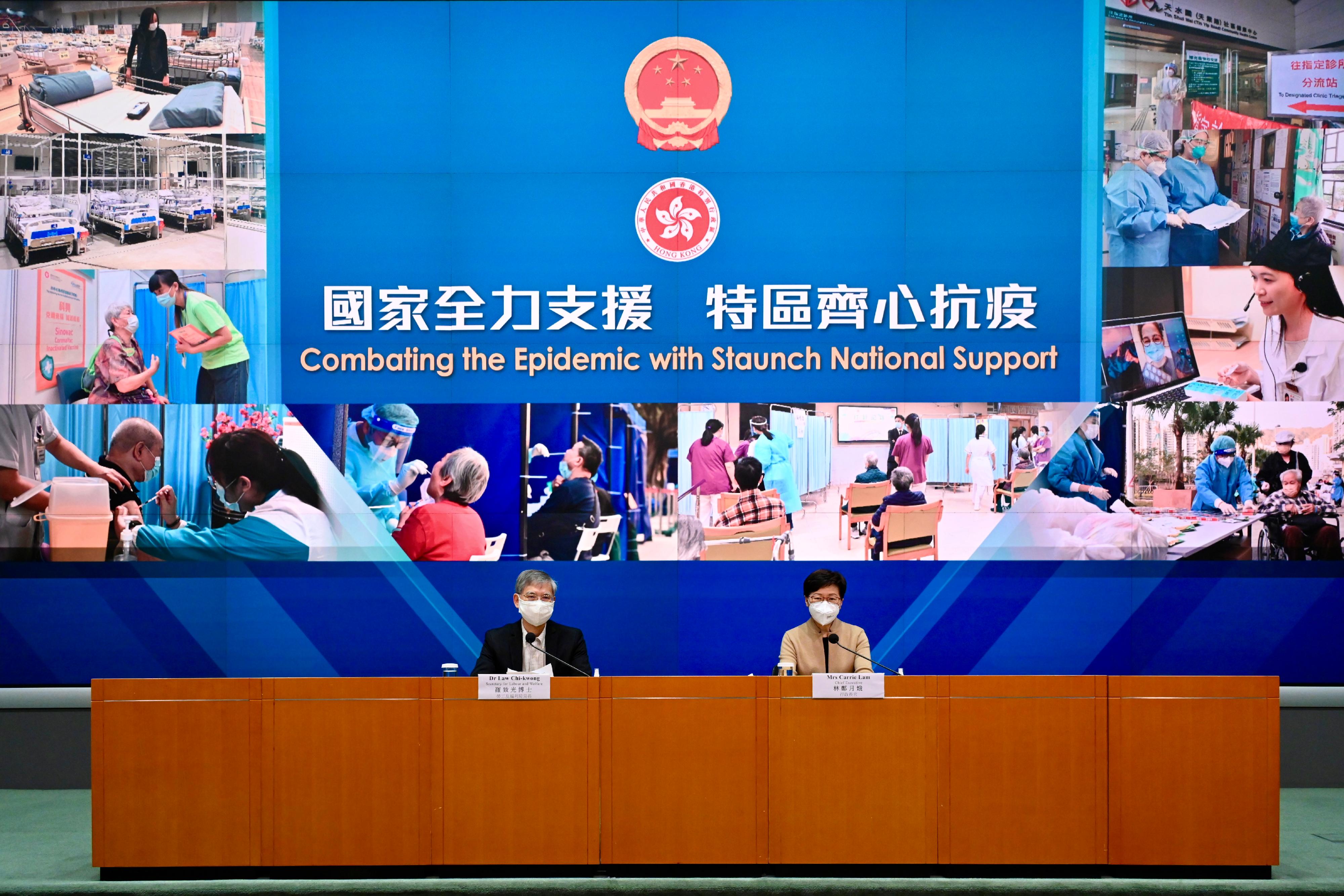The Chief Executive, Mrs Carrie Lam, held a press conference on anti-epidemic measures this morning (March 26). Also joining was the Secretary for Labour and Welfare, Dr Law Chi-kwong. Following is the transcript of remarks of the press conference:
Reporter: First, a local media (organisation) has reported that the Government will substantially relax the so-called place-specific flight suspension mechanism to encourage more inbound flights back to Hong Kong. Mrs Lam, can you verify the news, if so, what is the scale? And my next question is that Bernard Chan said this morning that he believes many of the companies and people who left Hong Kong because of the quarantine measures will not likely return, and he also said that we need to wait and see if Hong Kong can maintain its status as a financial centre. What is your view about Chan's comment? And also for the returning people, you know, back to Hong Kong, does the Government have any plan to add more designated quarantine hotels on top of the current 43? How can the Government find more and how many rooms does the Government aim to have in total? Thank you.
Chief Executive: Since my announcement on March 21 about lifting the place-specific flight suspension in respect of nine countries, I did say on this occasion that there were two outstanding issues we need to tackle based on feedback given to us by the airlines, by the aviation industry, by the people who have relatives stranded in those nine countries. These two issues are, one is, yes, we could allow airlines to resume inbound flights from these nine countries by lifting the place-specific flight suspension regime. But at the same time, from the very beginning of fighting the epidemic, in order to prevent and reduce the importation of cases, there was always this other measure called the route-specific, flight-specific suspension. That is, if an inbound flight brought into Hong Kong a certain number of positive cases upon arrival – in other words, they boarded the plane with a negative PCR test (polymerase chain reaction-based nucleic acid test) but then on arrival when they underwent the “test-and-hold” PCR test at the airport, they were found to be positive, that of course revealed that perhaps the rules had not been followed very stringently. I think we did have a case where one inbound flight brought in over 20 confirmed cases. There is always this need to maintain this route-specific and flight-specific suspension measure.
We have no plans to substantially reduce or relax the rule, because this rule is needed in order to meet the fundamental objective of preventing the importation of cases, especially when a lot of countries and places have significantly relaxed many of their epidemic measures, including wearing of masks and social distancing and vaccine pass and so on. So Hong Kong has to remain vigilant. So as far as this thing is concerned, the only thing is we are revisiting the various trigger thresholds to see whether there are, sort of, operational details that we could rationalise, but certainly not as described in the local media this morning as a major concession. I think the term used was "大讓æ¥". We are not contemplating any major concession. As a matter of fact, this is a public health infection control measure. This is not a sort of tug of war between the Hong Kong SAR Government and individual airlines. Ultimately, we will act in the best interests of Hong Kong.
The second issue that has been put to us is whether we have sufficient provision of designated quarantine hotels for those who could get on a flight to come back. They need to produce proof of a pre-booked hotel for at least seven nights, and prior to my announcement I think we did not have the 43 hotels that you mentioned. We probably had about 25 designated quarantine hotels with about 6 000 rooms, and many of them were actually quite fully booked because Hong Kong residents from other places could continue to come back. So I did promise again on this occasion that I will ask my colleagues to approach the hotels to see whether more of them could become a designated quarantine hotel. And on this front we are making some good progress and I believe the Food and Health Bureau will shortly announce that we are able to provide more designated quarantine hotels for those who could get on a flight and come back. That is about the issue of Hong Kong residents aspiring to come back.
I have not read the details of what Bernard Chan said. On what occasion he said, I don't even know. But I can tell you that although he is ExCo (Executive Council) Convenor, he is expressing his personal views. Because there are so many people with so many views on this anti-epidemic issue, especially about Hong Kong being an international city, whether we should open up more, whether we should be worried about people leaving Hong Kong. The more authoritative stance could only come from me and the Hong Kong SAR Government. I would advise that you only treat Mr Chan's views as his personal views, especially as he comes from the financial sector, certainly his view will be influenced by his colleagues and peers in the financial sector. But at the end of the day, as I said, our ultimate objective for Hong Kong is to suppress the fifth wave as soon as possible and then we would aim to resume some travel into the Mainland and preferably also with overseas so that business could resume and the economy could bounce back. Thank you.
(Please also refer to the Chinese portion of the transcript.)
Follow this news feed: East Asia






